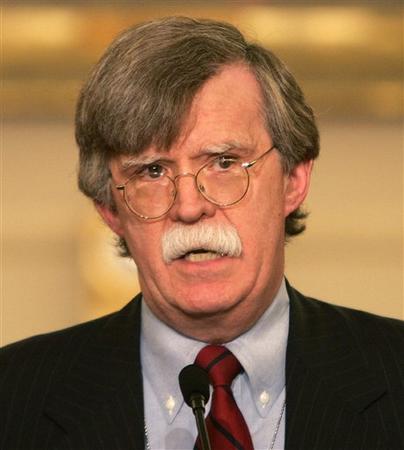Reunification Only Way to Defuse Korea Crisis
John R. Bolton/Gatestone Institute/June 01/17
Barack Obama’s foreign-policy failures, and those of his predecessors, regarding North Korea, are coming back to bedevil Donald Trump’s new presidency. Trump administration spokesmen have rightly said that Obama’s policy of “strategic patience,” a synonym for doing nothing, is over. But they have not yet articulated a replacement strategy.
Analysts across the political spectrum now believe that North Korea is perilously close to fabricating nuclear devices — at least five of which have already been detonated — small enough to mount on intercontinental ballistic missiles capable of striking targets within the continental United States. Some estimates posit this capability as early as 2018, with targets closer to the Korean Peninsula, including Japan and Hawaii likely at risk earlier.
Time is thus in desperately short supply, one of the fruits of 25 years of wasted efforts negotiating with Pyongyang. The harsh reality is that Kim Jung Un and his predecessors were never going to be chit-chatted out of their nuclear-weapons program, which they have always regarded as essential to regime survival. Neither persuasion nor coercion, nor any mix of the two, has succeeded before, and we have no reason to believe they will start succeeding now.
There are any number of suggestions about how to increase military pressure on North Korea, including scenarios for pre-emptive attacks against its nuclear and ballistic-missile assets. Certainly, no American president should be willing to countenance the risk to innocent U.S. civilians, and those of our vulnerable friends and allies in the region, that Pyongyang’s erratic leadership increasingly poses. Moreover, we must be sure China understands President Trump’s determination — reportedly explained in person to Chinese President Xi Jinping during the recent Mar-a-Lago summit — not to be held hostage by Pyongyang.
Unfortunately, however, years of savage Obama Administration defense budget cuts have rendered U.S. military options far from optimal. Obama underfunded national missile-defense programs, thereby rendering this last line of defense woefully inadequate compared to how President George W. Bush originally conceived it.
Similarly, our ability to neutralize North Korea’s military threats to the South, which have long worried United States and South Korean decision-makers, is severely challenged.
Since an American president’s highest obligation is ensuring the safety of our own citizens, pre-emptive or other military action against Pyongyang must always be a live option. And even though the time for peacefully eliminating the North’s nuclear threat is rapidly disappearing, there is still a diplomatic strategy worth trying. Indeed, it is now the only option with any prospect for long-term resolution of the ongoing Korean crisis.
Reunification of the two Koreas, effectively ending the North Korean state and merging it into the political and economic structures of the South, is both feasible and desirable. There is simply no point in further negotiations with Pyongyang, nor will anything be achieved by urging Beijing to strong-arm Pyongyang.
For decades, China has played a double game, asserting its opposition to a North Korean nuclear capability, but doing little or nothing to prevent it. Beijing has worried that effectively pressuring Pyongyang, which Beijing has the undeniable capacity to do, will collapse the regime itself, producing massive refugee flows into China and a long-planned U.S.-South Korean armed intervention, leaving China facing American military forces across the Yalu River.
China didn’t relish that prospect in 1950, nor does it today. Instead, President Trump should persuade Beijing that its own best interests lie in directing its economic leverage toward swift, orderly reunification of the Peninsula. China and the U.S. could jointly facilitate this process through mutually applied pressure and communication with the North’s captive population.
Most significantly, America has no interest in a military presence along China’s border, just as it prefers today not to have its troops in fixed positions along the DMZ. Instead, we have long sought to concentrate our forces near Busan, making them available for rapid redeployment as events might require.
There is a modus vivendi here acceptable to China, although negotiations on this and other reunification issues will undoubtedly be difficult.
Korea’s post-World War II partition along the 38th Parallel in 1945 was always intended to be temporary.
Three South Korean soldiers watch the border at Panmunjeom, in the Demilitarized Zone (DMZ) between North and South Korea. (Image source: Henrik Ishihara Globaljuggler/Wikimedia Commons)
The Cold War intervened, however, followed by the Korean War, and the Peninsula’s partition seemed frozen, as did Germany’s. But just as communism’s European collapse led to German reunification, so too, in time, will the partition of Korea be reversed.
The real question is whether it will end peacefully, with a minimum of turmoil and disruption, or whether it will end catastrophically with considerable loss of human life. China’s leaders, scholars, and policy analysts are split over the reunification issue.
Increasingly, however, key Chinese strategists have come to conclude that the Kim family’s authoritarian dynasty is an ugly piece of baggage, of little real strategic utility to China, but one that brings with it enormous burdens and risks.
Had we opened quiet negotiations with China over reuniting Korea a decade ago, the problem might already be resolved. Starting talks only now places the diplomacy in a race with North Korea’s rapidly advancing nuclear capabilities, with the outcome far from certain.
Nonetheless, since we are clearly and correctly unwilling to accept a nuclear North Korea with global strike capabilities, and since we wish to avoid if possible outright military action against the North, reunification is plainly the most desirable outcome.
*John R. Bolton, a senior fellow at the American Enterprise Institute, served as U.S. Ambassador to the United Nations under former President George W. Bush. Reprinted from Newsmax Magazine by permission of the author.
© 2017 Gatestone Institute. All rights reserved. The articles printed here do not necessarily reflect the views of the Editors or of Gatestone Institute. No part of the Gatestone website or any of its contents may be reproduced, copied or modified, without the prior written consent of Gatestone Institute.






















